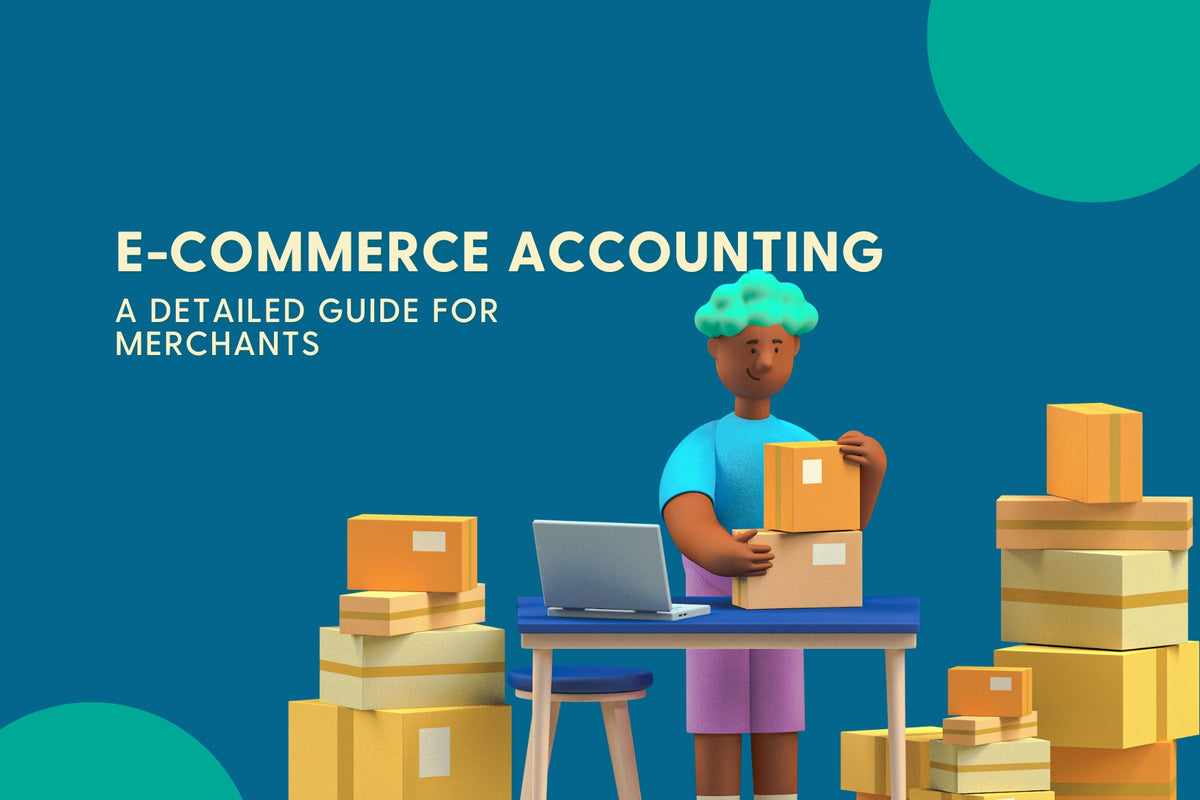Can we tell you a secret? The success of your e-commerce business is short-lived. Well, before you say something in defense. Allow us to explain ourselves. The success metrics are unstable only if you don’t follow the right E-commerce accounting practices.
If your marketing, operational, and payroll expenses exceed your sales, it is time to take a pause and see where you are going wrong. You cannot afford to be bankrupt or constantly look for the next round of funding.
Thus, we have compiled this blog, to help you make better decisions and always ensure business compliance. Let’s read ahead to know more!
2 Main E-Commerce Accounting Methods for Merchants
You can follow these e-commerce accounting methods to keep your finances on track.
1. Cash-Basis Accounting
This accounting method is based on actual cash flow. In simpler terms, it is like a business bank statement. Here sales and records are recorded only when cash enters/exits your business account.

So, if a customer has ordered a product but has not yet paid for it, the sale will continue to remain unrecorded. Such an accounting method is ideal for new businesses with simple financial transactions.
2. Accrual Accounting
Accrual accounting follows a more apt and comprehensive approach. It is not dependent on when the cash is exchanged, it is done whenever a transaction is done. This means whenever you make sales or have an expense, it is logged immediately, irrespective of the fact that the cash has been debited/credited to your account.
It is ideal for e-commerce businesses with complex operations and the ones dealing with larger amounts of credit transactions. A good online invoicing software will help you match the cost of inventory in real time and get a more accurate and timely representation of business finances.
Top Accounting Challenges E-commerce Businesses Face
E-Commerce businesses go through a sea of challenges and that can impact their financial operations. Here are some of the common challenges faced by E-commerce businesses.
1.Sales Tax Compliance
E-commerce businesses sell products across multiple states and even countries. While this is great for revenue generation, it can become increasingly difficult to understand and navigate different tax regulations and rates. Thus, if you are not taking the guidance of tax-compliance experts or outsourcing your services you can end up in a mess.
2. Inventory Management
Understocking and overstocking are both common challenges faced by ecommerce businesses. Thus, it is a must to track inventory levels, handle returns, and take strict measures to solve these issues.
3. Revenue Recognition
If you offer subscription-based services or products like memberships and gift cards, it can become tricky to allocate revenue. Developing an understanding of the same and carefully implementing e-commerce accounting practices is a must.
4. Cost Allocation
E-commerce accounting is not as simple as selling price minus cost price. There are costs like customer acquisition, shipping costs, overhead costs, and marketing expenses that need to be taken care of. Thus, you need to have measures in place that properly allocate such costs and simplify financial reporting.
5. Filing Returns
Accounting E-commerce can get tough if returned records are not tracked and accurate inventory evolution is not done. Thus, you need to have a process that helps you wade through the complex maze and analyze in real-time if the returned items can be refunded, replaced, or handled another way as per your business rules.
Moreover, you will need to assess the condition of the goods and see if there is scope for repair. Automation tools aid you in solving return processes and guarantee financial accuracy at all times. Thus, helping you shift your focus to providing excellent customer service.
6.Tracking Seller Fees
Keeping a check on seller fees helps you understand financial performance better and make suitable business decisions. This fee involves all the costs incurred when you use a platform to sell products.
There are multiple charges including subscription fees, referral fees, transaction fees, and advertising fees. Thus, if you are not tracking these charges, it can lead to poor profitability.
7. Access to Data Analytics
E-commerce accounts can become haywire without access to comprehensive data. When you don’t have access to sales trends, customer behavior metrics, and other important metrics, it can become difficult to forecast revenue, experiment with pricing strategies, and manage inventory.
Moreover, zero to minimum access to analytics also means losing track of fraudulent activities and paving the way for potential accounting errors. Thus, there is a need for leveraging technology, onboarding skilled professionals, and implementing sound analysis systems to extract meaningful data.
Benefits of E-Commerce Accounting For Your Business
The right accounting for e-commerce involves keeping a clear record of all money. Efficient bookkeeping helps businesses plan their finances in and out, thus making it a must-have function for your online business.
1. Comprehensive and Advanced Financial Insights
A good e-commerce accounts system helps you get a holistic image of your business’s financial performance in real-time. This further lets you forecast inventory needs, identify the latest sales trends, and rectify any errors quickly. Thus, letting you focus on your business activities and expand your operations with ease.
2. Smooth Cash Flow Management
Keeping track of your cash flow and profitability are two different but important aspects of your business. When you have crystal clear clarity on your earnings and expenses, you can tweak your profit margins and look forward to improved investments and savings.
Also, in the long run, you will have better insights on how to replenish your stock, how and when you should invest in new resources or tools, and where you can cut costs to improve profits.
3. Accurate Business Analytics
Accounting e-commerce systems not only help you with multiple reports, but they also help you categorize all functions with ease. These include profit levels, cash flow, total sales, and other parameters. All these reports will help you develop a strong foothold and develop an exhaustive and robust business strategy.
4. Attractive Pricing Strategies
Let’s be honest, e-commerce businesses face tough competition. Quality and the right pricing are crucial for attracting and retaining customers. Luckily, an accounting for ecommerce solution lets you adjust pricing and maintain profits, all while offering added value to customers.
ECommerce Accounting- Best Practices
Here are some of the practices you must follow to simplify ecommerce accounts.
1. Keep Business and Personal Finances Separate
The first step to having accurate accounting records is to have separate bank accounts for your personal and business finances. This lets you track business expenses, have accurate accounting records, simplify taxes, and make revenue calculation easier.
2. Pick the Right Accounting Software
A software that can be customized to fulfill all your accounting ecommerce needs should be your choice. Thus, ensure the solution offers functionalities like automated tax calculations, sales channels, inventory management, invoice generation, and advanced reporting & analytics features.
3.Keep A Tab on Sales and Inventory
Timely sales and inventory tracking are a must for all e-commerce businesses. So, make sure you regularly update sales records and calculate the cost of goods sold, and product quantities with your accounting solution. This will help you in making informed financial decisions and get better profit margins.
4.Automate Bookkeeping Processes
You can set up your bank feed to import transactional data in your accounting software. Automating the core processes is possible when you make it a point to utilize features like bill payment reminders and recurring invoices.
5. Monitor Cash Flow
To fulfill your financial obligations it is a must to keep a close eye on your cash flow. When you review your statements regularly, you will be able to identify potential shortfalls and take measures to boost business revenue. Moreover, you will be able to manage inventory levels and have better pricing strategies.
6. Ensure Compliance with Tax Obligations
E-commerce businesses often face complex tax requirements, especially when selling across different jurisdictions. Consult with a tax professional to ensure compliance and understand your obligations regarding sales tax, VAT, or GST. Consider integrating tax automation software with your e-commerce platform to simplify tax calculations and filing.
7. Maintain Accurate Records
To run your business smoothly you need to keep track of all your financial transactions.
These include your expenses, receipts, and sales. This will help you a lot during your audits, file accurate tax returns, and boost financial decision-making. Thus, it is a must to reconcile bank accounts regularly and analyze financial statements for enhanced accuracy.
8. Seek Guidance
As your business grows in size, you cannot solely rely on your e-commerce accounting acumen. Thus, you must consider partnering with an e-commerce accountant.
They will help you with valuable insights tailored to your specific industry and solve complex accounting problems. Embracing technology and having the right guidance is a must to streamline your accounts and keep your business on the path to success.
Wrapping Up
Good e-commerce accounting practices will help you stay a step ahead of your competitors. Understanding your finances in and out is the first step to taking your business to higher echelons of success.
Accounting for e-commerce businesses will help you plan budgets, grow steadily, and boost business value. Moreover, it will help in making informed business decisions.





